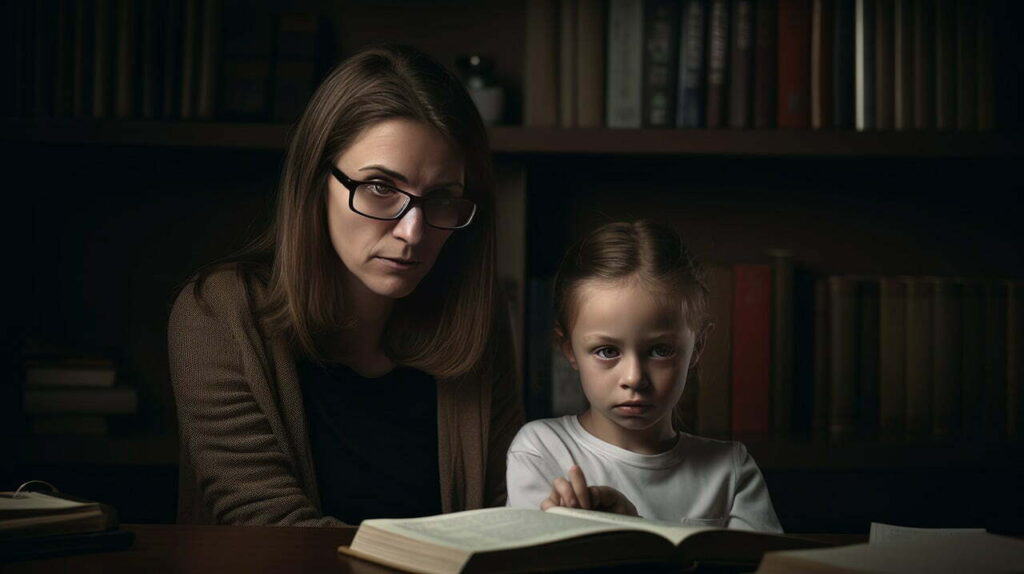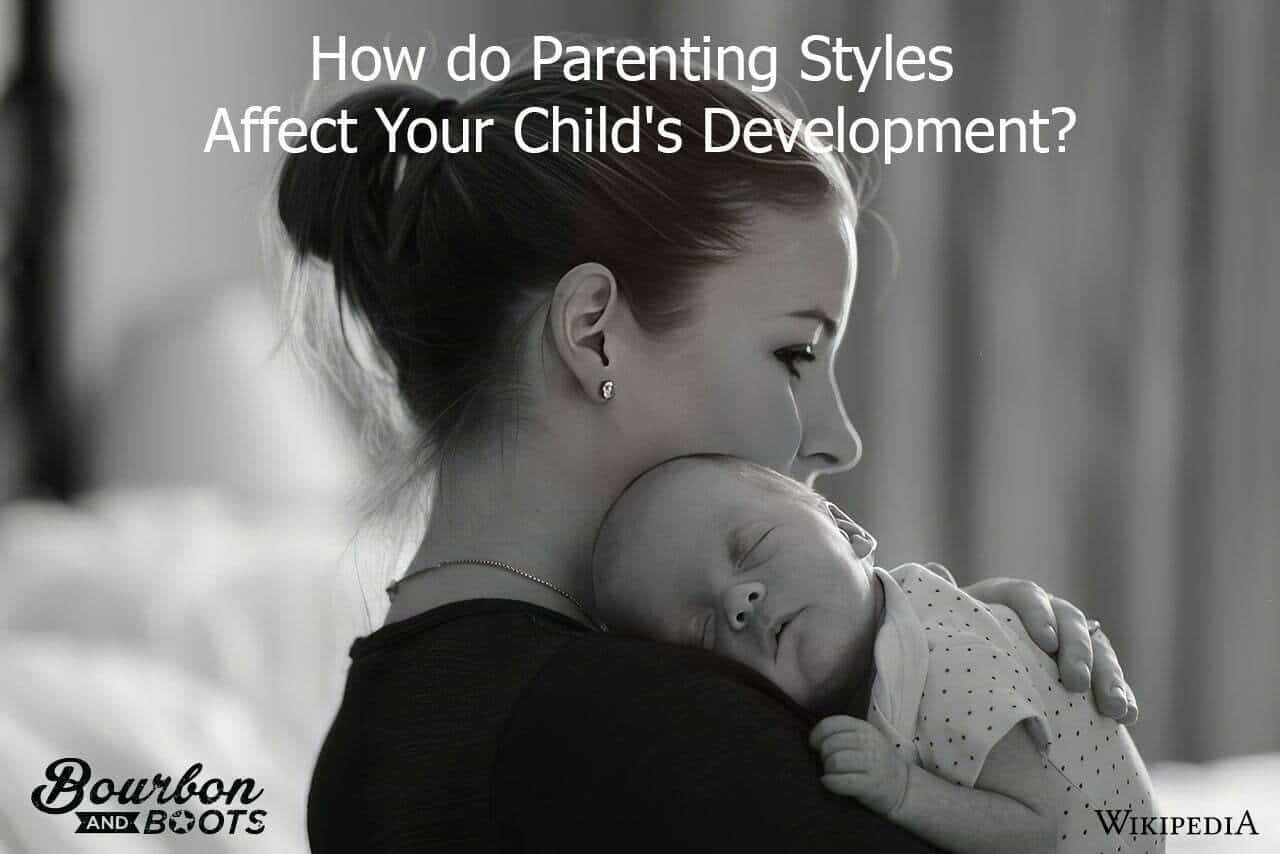Parenting is an ever-evolving journey, and the style we choose to raise our children significantly impacts their development. In this blog post, we’ll delve into the four main types of parenting styles – authoritarian, authoritative, permissive, and uninvolved – and examine how they affect your child’s emotional growth, behavior, and academic achievement.
Table of Contents
Understanding Parenting Styles
Understanding the different parenting styles, including authoritarian, permissive, authoritative, and uninvolved, is crucial in determining how they can impact a child’s emotional development and behavior.
Authoritarian Parenting Style

Authoritarian parenting is typified by a strict and often inflexible approach to raising children, where the parent’s expectations are high, and their control over their child’s life is rigid.
Although this type of parenting can result in obedient and well-behaved children, it may come at a price. Research has shown that kids raised under authoritarian parents tend to have lower self-esteem, struggle with social competency, and face an increased risk of anxiety and depression later in life.
For example, while your son might excel at sports because you’ve pushed him hard to practice continuously, he may suffer socially due to lacking emotional support from his father during tough times.
Permissive Parenting Style

Permissive parenting, also known as indulgent parenting, is a style where parents make relatively few demands on their children and prioritize nurturing close emotional connections.
This approach to raising kids offers plenty of affection, warmth, and freedom for children to explore their interests without much guidance or structure imposed by the parent.
In this relaxed environment created by permissive parents, children can express themselves without fear of judgment or criticism from their caregivers.
However, it’s important for dads to be aware that while it may lead to an increased sense of creativity and self-confidence in your child initially – excessive permissiveness may have negative consequences, including decreased self-control and self-discipline over time.
For instance, a child raised with a permissive parent might struggle with setting boundaries for themselves or making responsible decisions because their caregiver never provided clear expectations.
Authoritative Parenting Style

The authoritative parenting style strikes a healthy balance between fostering independence and setting boundaries for your child. As a dad, embracing this approach means being nurturing, responsive, and supportive while still maintaining clear rules and expectations.
For example, consider the scenario of managing screen time for your children. An authoritative father might set specific hours each day when screens are allowed or provide incentives to encourage responsible usage; at the same time, he remains open to discuss any concerns or suggestions his kids may have related to the rules.
This collaborative yet structured approach breeds confidence in children as they learn self-regulation skills within safe boundaries—an essential toolset that will serve them well throughout their lives.
Uninvolved Parenting Style

The uninvolved parenting style is also known as neglectful parenting, and it’s characterized by a lack of responsiveness to a child’s needs and low demandingness. Neglectful parents do not pay attention to their children’s emotional, social, or academic development.
They don’t provide support or guidance for the child and often leave them without any clear boundaries or expectations.
It is crucial for parents to understand the different types of parenting styles so they can avoid being neglectful toward their children. It’s important for parents to be responsive to their children’s needs while providing appropriate boundaries that encourage independence while keeping them safe.
The Effect Of Authoritarian Parenting Style On Child Development
Children raised with authoritarian parents may become highly obedient but often struggle with low self-esteem and creativity.
Increased Obedience But Decreased Self-esteem And Creativity
Strict rules, high expectations, and a lack of flexibility characterize authoritarian parenting styles. Children raised in such environments tend to be obedient but may struggle with self-esteem and creativity because their opinions are often dismissed or undervalued.
For instance, if an authoritarian father tells his son that he must become a doctor and follow in his footsteps, the child may feel pressured to comply even if they have no interest in medicine.
As they grow older, this can lead to feelings of inadequacy and disconnection from their identity.
The Effect Of Permissive Parenting Style On Child Development
Children raised with permissive parents may develop a sense of entitlement and struggle with self-discipline, making it essential for parents to find a balance between structure and warmth in their parenting style.
Increased Creativity But Decreased Self-control And Self-discipline
A permissive parenting style may seem like a flexible approach, but it can have adverse effects on children’s behavior. Children raised in permissive households tend to have higher levels of creativity, which is undoubtedly good! However, they also exhibit lower levels of self-control and self-discipline.
Permissive parents are often very hands-off when setting rules or expectations for their kids, allowing them to make many decisions independently. While this can be empowering and teach autonomy, it can also lead to negative outcomes such as poor impulse control and disregard for authority figures.
Studies show that these children tend to struggle with social skills and empathy later in life due to a lack of discipline during childhood.
The Effect Of Authoritative Parenting Style On Child Development
Children raised with authoritative parents tend to have higher emotional intelligence, independence, and stronger social and emotional skills.
Increased Self-Esteem, Academic Achievement, And Independence
As a dad, one of the most important things we want for our children is to see them thrive and succeed. And research suggests that the authoritative parenting style may be the key to achieving just that.
Children raised by authoritative parents tend to have increased self-esteem, academic achievement, and independence. This parenting style involves being supportive and affectionate towards your kids while also establishing clear rules and consequences.
By offering guidance rather than control, you can help your child develop a sense of responsibility and autonomy that will serve them well throughout their lives.
The Effect Of Uninvolved Parenting Style On Child Development
An uninvolved parenting style, where a parent neglects the child’s emotional and physical needs, can greatly increase the risk of behavioral problems and emotional difficulties in children.
Increased Risk Of Behavior Problems And Emotional Difficulties
Uninvolved parenting is a style characterized by low responsiveness and low demandingness, where parents make few to no demands on their children and are often indifferent, dismissive, or neglectful.
This parenting type can significantly negatively affect a child’s emotional development. Children raised in uninvolved homes may struggle with self-esteem issues and experience emotional difficulties such as anxiety and depression.
Research suggests that children who grow up with uninvolved parents may be more likely to develop physical, psychological, and behavioral issues in adulthood. For example, they may have trouble forming healthy relationships or achieving success in school or work.
It’s important for fathers to recognize the risks associated with this parenting style and consider alternative approaches that prioritize nurturing relationships between parents and children.
Identifying Your Parenting Style

Identifying your parenting style is crucial in understanding how it affects your child’s development.
Self-Reflection And Assessment
Reflecting on your parenting style is important in ensuring your child’s healthy development. Here are some tips for self-reflection and assessment:
- Take note of your typical reactions to your child’s behavior. Do you often resort to punishment or criticism? Or do you take the time to talk through their actions and feelings?
- Consider how involved you are in your child’s life. Are you present during important moments, such as school events or extracurricular activities? Do you actively listen and engage with them?
- Evaluate how consistent you are with discipline and routines. Are rules enforced consistently, or do they vary depending on your mood or circumstances?
- Think about your expectations for your child. Are they realistic, age-appropriate, and communicated clearly?
- Assess the level of warmth and affection in your relationship with your child. Do you express love and appreciation regularly, or is there a distance between you?
- Reflect on any areas where you could improve as a parent, such as communication skills or managing stress effectively.
By taking the time to assess your parenting style, you can make adjustments that will better support your child’s growth and development into a well-rounded individual who thrives physically, mentally, emotionally, and socially.
Seeking Professional Help
Identifying your parenting style can be challenging, especially if you are unsure about your approach to raising children. Seeking professional help from a psychologist or family therapist can provide you with valuable insights into your parenting style and its effects on your child’s development.
A licensed professional can use effective assessment tools to identify which of the four main types of parenting styles you exhibit: authoritative, authoritarian, permissive, or neglectful.
Research suggests that parents who seek professional help in identifying their parenting styles tend to have better relationships with their children and raise kids who perform well academically and socially.
Professional guidance can also aid parents in navigating challenging situations such as divorce, blended families, or special needs children.
Implementing Effective Parenting Styles
To implement effective parenting styles, it’s important to understand your child’s needs, communicate effectively with them, and establish clear boundaries and consequences.
Understanding Your Child’s Needs
Understanding your child’s needs is one of the most important factors in effective parenting. Every child is unique and has individual needs, which means that a one-size-fits-all approach to parenting rarely works.
For example, if you have a child who tends to be more introverted and sensitive, they may not respond well to harsh discipline or raised voices. On the other hand, a child who is more outgoing and confident may need firmer boundaries and expectations.
By understanding your child’s needs on an individual level, you can tailor your parenting approach for optimal results.
Communicating Effectively
Effective communication is a vital aspect of successful parenting styles. Here are some tips on how men can communicate effectively with their children:
- Listen actively: Be present and attentive when your child is speaking to you, and respond appropriately to what they say.
- Use positive language: Avoid negative or critical language that can contribute to low self-esteem in children. Instead, use positive reinforcement and praise for good behavior.
- Be clear and concise: Children don’t respond well to unclear or lengthy explanations, so make sure your message is simple and easy for them to understand.
- Be consistent: Consistency in your communication helps build trust between you and your child, which can lead to better outcomes in the long run.
- Encourage open dialogue: Create an environment where your child feels comfortable expressing their thoughts and feelings without fear of judgment or negative consequences.
Remember, effective communication between parents and children plays a crucial role in promoting healthy development and relationships. By implementing these simple tips, you can become a more effective communicator with your children.
Establishing Clear Boundaries And Consequences
As a parent, it is important to establish clear boundaries and consequences for your child’s actions. This helps them understand what is expected of them and what will happen if they do not follow the rules. Here are some tips for setting clear boundaries and consequences:
- Be consistent: Children need consistency to understand their expectations. Make sure that you enforce the same rules every time.
- Use positive reinforcement: Instead of only punishing bad behavior, also reward good behavior. This can motivate your child to follow the rules and continue doing well.
- Explain the consequences beforehand: Let your child know what will happen if they break a rule before it happens. This gives them a chance to think about their actions and make better choices.
- Follow through with consequences: If your child does break a rule, make sure you follow through with the consequence you’ve established. This reinforces the importance of following rules and shows that there are real consequences for bad behavior.
- Re-evaluate as needed: As your child grows and develops, they may need different boundaries and consequences. Be open to re-evaluating what works best for your family.
Remember, establishing clear boundaries and consequences is an important aspect of effective parenting, regardless of your parenting style. It sets expectations for your child and helps them grow into responsible adults who understand that their actions have consequences.
Tips For Balancing Different Parenting Styles Between Partners
Understanding each other’s parenting styles and compromising on common goals can help partners balance their different parenting styles.
Understanding Each Other’s Parenting Styles
It’s crucial to understand and respect each other’s parenting styles when co-parenting. Take an honest inventory of your own style, identify its strengths and weaknesses, then compare them with your partner’s approach.
Try not to judge or criticize their methods because you come from different backgrounds or have divergent expectations; instead, think creatively about how you can blend the two styles together for better outcomes.
For example, if one parent is authoritative while the other is permissive, they could agree on setting clear and consistent boundaries but also allowing some room for flexibility within those limits.
Compromising And Setting Common Goals
In parenting, it’s important for partners to work together and find a balance between their different styles. Here are some tips for compromising and setting common goals:
- Prioritize your child’s needs: Put your child’s needs first and work together to find solutions that benefit them.
- Discuss your parenting styles: Have an open conversation about your parenting styles and talk about which aspects you want to blend or modify.
- Identify shared values: Work together to identify the values that matter most to both of you, such as respect, discipline, or independence.
- Define roles: Define each partner’s role in the household based on their strengths and preferences.
- Set rules and boundaries: Establish clear rules and boundaries that both partners can agree on, such as curfews, screen time limits, or chores.
- Be flexible: Be willing to compromise when necessary and adjust your approach as your child grows and develops.
Remember that every family is unique, and there is no one “right” way to parent. Focusing on what works best for your family and working together can help your child thrive in a nurturing environment.
Frequently Asked Questions (About Parenting Styles)
What are the different parenting styles?
The four main parenting styles are authoritative, authoritarian, permissive, and neglectful.
How does an authoritative parenting style affect a child’s development?
Children raised by authoritative parents tend to have high self-esteem, good academic performance, and effective decision-making skills due to consistent communication and positive reinforcement from their caregivers.
What negative effects can result from a neglectful parenting style?
Neglectful parents often fail to provide necessary emotional support or basic needs like food, shelter, and medical care for their children, which can lead to long-term physical and mental health issues such as malnutrition, anxiety, or depression.
Can a parent switch between different types of parenting styles for their child’s benefit?
It is possible for a parent to modify their behavior based on the individual needs of each child or situation they face but consistently shifting between different extremes in response may confuse children about what behavior is expected of them while also potentially eroding trust if done frequently enough. It is important that any changes made consider both the developmental stages & specific challenges faced by offspring before deciding upon adjusted approaches that address these areas specifically instead of trying to fix all problems simultaneously without proper planning or forethought being given towards consequences resulting thereof.
Conclusion
In conclusion, understanding the different types of parenting styles and their effects on child development is crucial for any parent. Whether you lean towards an authoritative or permissive style, finding a balance that works for your child’s needs is important.
Keep in mind that while each parenting style comes with its pros and cons, none are inherently “good” or “bad.” It’s all about finding what works best for you and your family dynamics.
By reflecting on your own upbringing and seeking professional help if needed, you can implement effective parenting practices that support your child’s emotional and academic growth.


